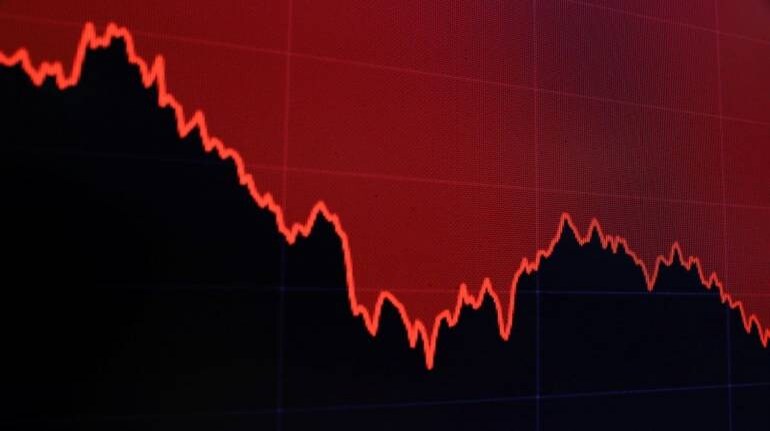
The S&P BSE Sensex plunged over 1,700 points to trade below 29,000 on on March 18 while Nifty50 broke below crucial support levels of 8,500 to hit a fresh 3-year low, tracking muted trend seen in other Asian and European markets.
At close, the BSE Sensex was down 1,709.58 points or 5.59 percent at 28,869.51 and the Nifty50 fell 498.25 points or 5.56 percent to 8,468.80.
Sectorally, selling pressure was seen in banks, financials, as well as telecom stocks.
"The Trump administration on Tuesday unveiled a $1 trillion stimulus package that could deliver $1,000 cheques to Americans within two weeks to buttress an economy hit by coronavirus while many other governments look to fiscal stimulus," the report added.
We have collated a list of five factors which could be weighing on markets:
Morgan Stanley warns of global recession:
Factoring the worst, Morgan Stanley in a note on March 17, warned investors that the seismic waves of COVID-19 are likely to trigger a global recession.
"Global recession in 2020 is now our base case scenario," Morgan Stanley Chief Economist Chetan Ahya said in a note on March 17. “We expect 2020 global growth to dip to 0.9 percent, the lowest since the global financial crisis when global growth bottomed at -0.5 percent in 2009. This time will be worse than the global recession of 2001,” the note added.
Under the base case scenario for India, Morgan Stanley estimates India’s growth rate at around 4.5 percent till Q4CY20, and in bear case, it could be near 4 percent.
The Reserve Bank of India (RBI), the global investment bank expects, could slash policy rates by a cumulative 40-65 basis points in the second quarter of the calendar.
S&P lowers India's growth forecast to 5.2% in 2020
S&P Global Ratings on Wednesday lowered India's economic growth forecast to 5.2 percent for 2020, saying the global economy is entering a recession amid the coronavirus pandemic.
The agency had earlier projected a growth rate of 5.7 percent during the 2020 calendar.
Asia-Pacific economic growth in 2020 will more than halve to less than 3 percent as the "global economy enters a recession", S&P said in a statement.
India halts key policy plans as revenues shrink: sources
India has dropped at least three crucial policy initiatives, including lowering import taxes on vegetable oils, as the outbreak of the coronavirus hits government revenue collection, said a Reuters report quoting two sources said on Tuesday.
India’s income tax revenues contracted 3.5 percent in the first 11 months of the current fiscal year, which began in April 2019, and income from other taxes grew by a meager 3.8 percent, the finance ministry told parliament on Monday, said the report.
The food ministry had proposed lowering import taxes on crude and refined vegetable oils, including palm oil, by 3-7 percent to keep a lid on domestic prices that leapt more than 11% after India restricted palm oil imports from Malaysia in January.
Banking stocks plunge; lead sectoral fall
NiftyBank plunged nearly 6 percent, the lowest since February 2017. The fall in the index was led by losses in IndusInd Bank, Kotak Mahindra Bank, HDFC Bank, ICICI Bank etc. among others.
“All industries got impacted by the novel coronavirus outbreak or COVID-19. One should definitely start buying quality stocks in tranches. The selling in large banks, IndusInd Bank, Axis Bank, etc. indicated that there is too much pessimism in the market due to expected weak global growth,” Siddharth Purohit of SMC Institutional Equities said in an interview with CNBC-TV18.
Shares of IndusInd Bank plunged more than 30 percent in intraday trade to hit a six-year low of Rs 382.55 on March 18 amid weak market conditions and no relief from Supreme Court to telecom players in the AGR case. The stock closed at Rs 459.85, down 23.90 percent.
IndusInd Bank has around 2 percent exposure to Vodafone Idea which could find it difficult to pay the entire amount on short notice. So far Vodafone Idea had paid Rs 6,854 crore towards AGR dues.
Discover the latest Business News, Sensex, and Nifty updates. Obtain Personal Finance insights, tax queries, and expert opinions on Moneycontrol or download the Moneycontrol App to stay updated!
Find the best of Al News in one place, specially curated for you every weekend.
Stay on top of the latest tech trends and biggest startup news.